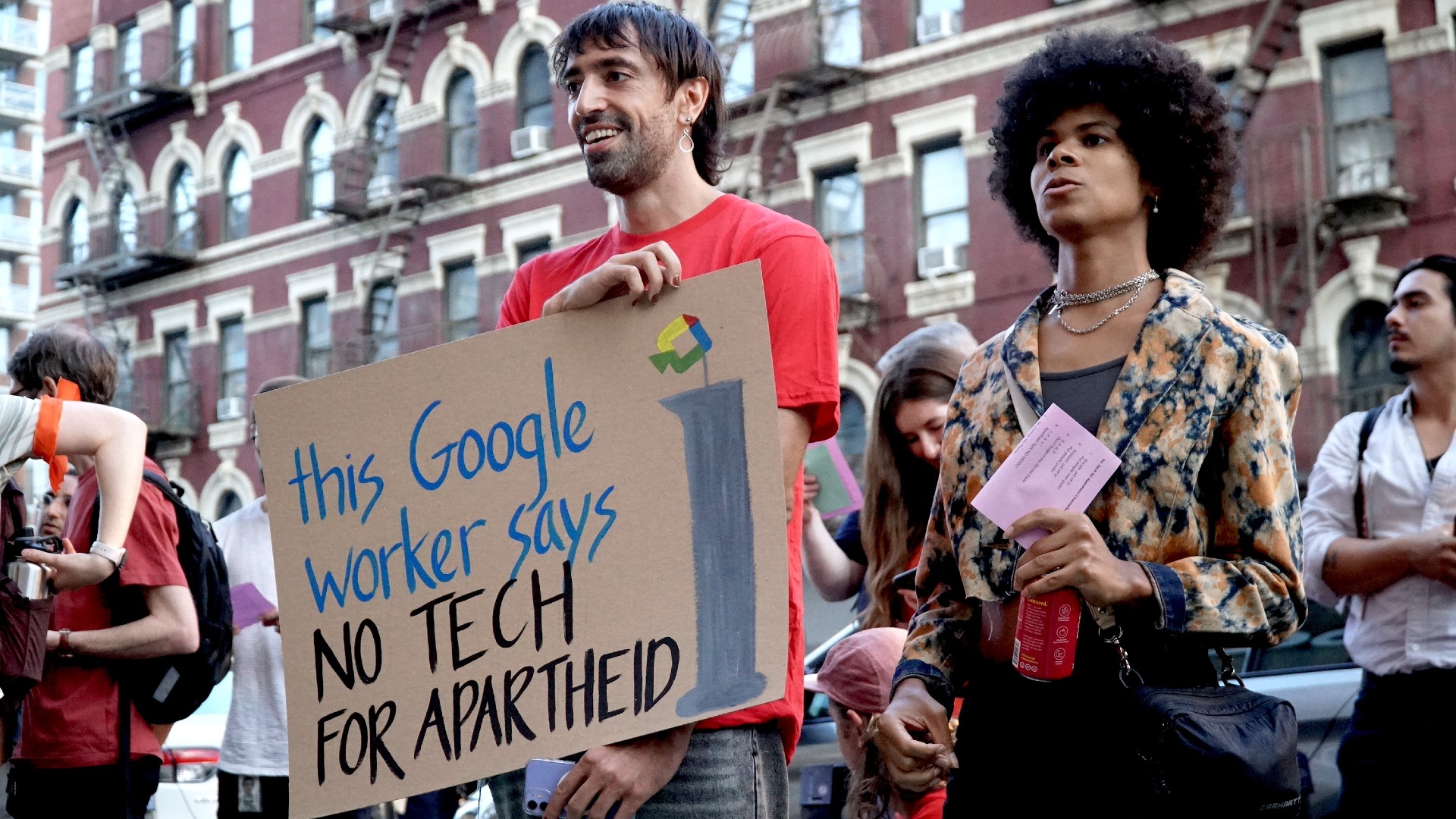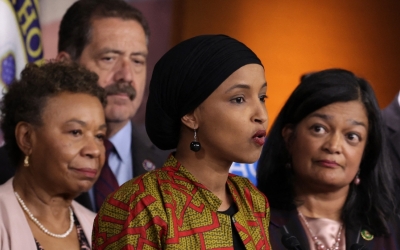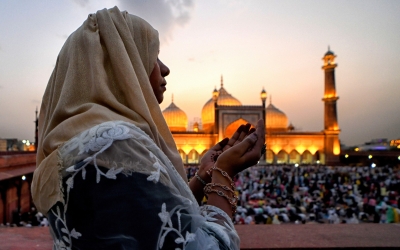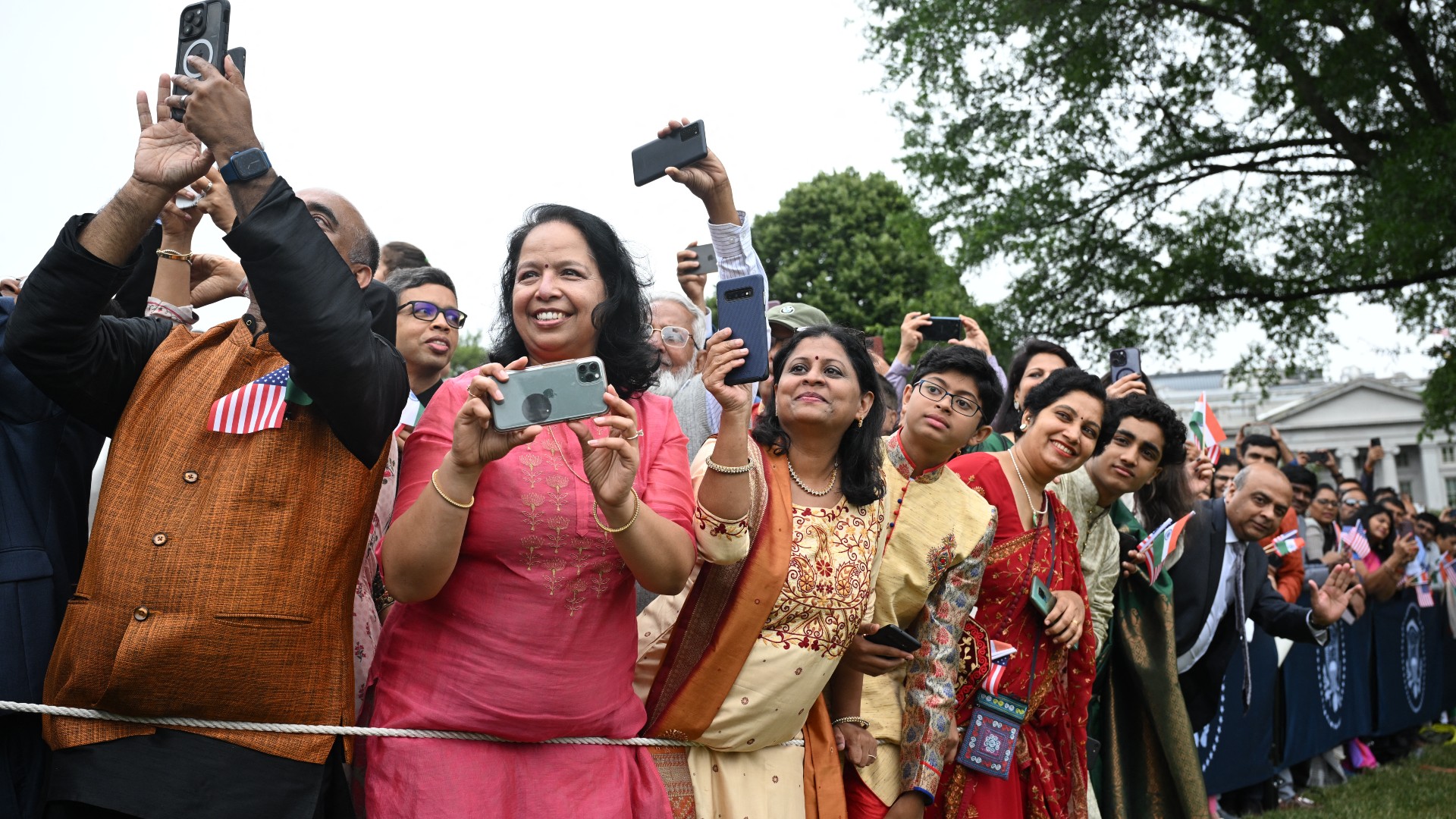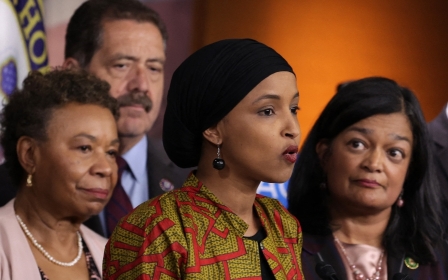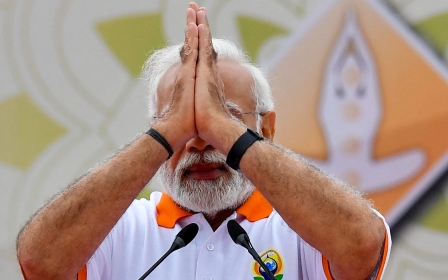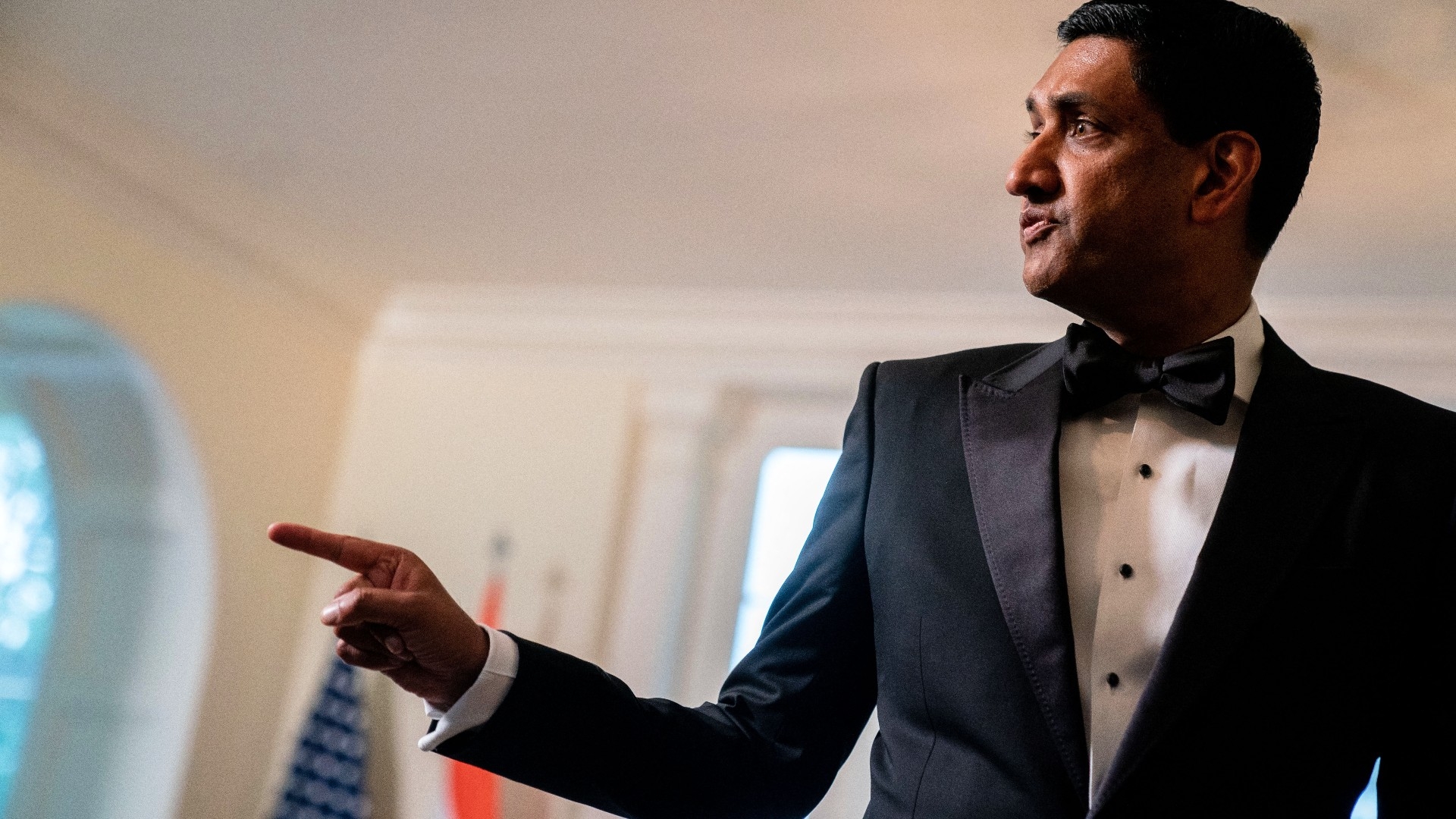
Ro Khanna: The Silicon Valley 'progressive' pushing closer US ties to Modi's India
When India was subject to intense international scrutiny following Narendra Modi's decision to annex Indian-controlled Kashmir in late August 2019, an article in The Caravan, India's premier long-form magazine, began doing the rounds on social media.
The long read, written by activist Pieter Friedrich, detailed the role of the Hindu nationalist lobby in American politics, and focused on then-Congresswoman Tulsi Gabbard from Hawaii.
Friedrich forensically outlined how the Hindu right-wing paramilitary organisation, the Rashtriya Swayamsevak Sangh (RSS), had funded Gabbard in exchange for helping rehabilitate Modi's image in the United States.
But it wasn't just the article that caught the attention of South Asian Americans.
Instead, it was the unprompted interjection by an Indian American lawmaker from California.
New MEE newsletter: Jerusalem Dispatch
Sign up to get the latest insights and analysis on Israel-Palestine, alongside Turkey Unpacked and other MEE newsletters
"Important article," tweeted Congressman Ro Khanna from the 17th district in California, widely known as Silicon Valley, the only district in continental America with an Asian majority.
"It's the duty of every American politician of Hindu faith to stand for pluralism, reject Hindutva, and speak for equal rights for Hindus, Muslims, Sikhs, Buddhists and Christians. That is the vision of India my grandfather Amarnath Vidyalankar fought for," the Congressman added.
Vidyalankar was an Indian activist who became a member of the Indian National Congress and later an MP in post-independent India.
Until then, the question of rising Hindu nationalism in India under Modi was mostly limited to segments of the Indian-American community, particularly Muslims, Dalits and Christians, as well as the Kashmiri diaspora.
But in a single tweet, the pro-union Khanna, known for pushing for stronger gun legislation and a key voice, along with Senator Bernie Sanders, in pushing for an end to US support for the Saudi-led war in Yemen, had taken the spectre of the role of Hindu nationalism in US politics to the very seat of the US government.
Amar Shergill, an executive board member of the California Democratic Party (CDP) and chair of the CDP Progressive Caucus, described the moment as a "political shift" in the South Asian American community.
"It reverberated from its origin in the progressive wing of the Democratic Party with implications for the United States, India and world geopolitics," Shergill wrote.
Predictably, Khanna endured a blitz of criticism from Hindu nationalist groups and individuals. More than 200 Indian American organisations would go on to register complaints against him, forcing him to hold a town hall to address the allegations.
Khanna was even asked to resign from the Congressional Pakistan Caucus.
At the time Khanna stood firm. He called his detractors fringe elements and Trump supporters.
"I have no tolerance for right-wing nationalists who are affiliating with Trump. And let me tell you something - they're in an echo chamber, but their bigotry, their right-wing nationalism, their support for Trump or for white supremacy is a minority," Khanna said.
"But they will see that our district is pluralistic and I have no problem standing up against them," he added.
Modi's state visit
Four years later, activists and observers say, Khanna appears to have adopted a more realist approach to the rise of Hindu nationalism.
When it became known that Modi would be travelling on his first state visit to the US in June, Khanna in his capacity as co-chair of the India Caucus, wrote a bipartisan letter calling for Modi to address a joint seating of Congress.
Ahead of the visit, activists and observers warned that Khanna's invitation was as good as an endorsement of Hindu nationalist policies.
Shergill, chair of the CDP Progressive Caucus, told Middle East Eye that although he understood the need for the US to strengthen ties with India, it was a mistake to have honoured Modi with a state dinner and an address to Congress.
"The India Caucus, the Sikh Caucus, and all South Asian congressional representatives have a special duty to hold Modi and the Bharatiya Janata Party (BJP) accountable," he said.
"Representative Khanna must do better," Shergill added.
Activists pointed out that during the four years where Khanna had pointedly rejected Hindu nationalism, the Hindu nationalist project had reached the higher echelons of the Indian state, in which it had become routine for right-wing Hindu monks to call for ethnic cleansing without consequence.
Several indicators, too, showed freedom of speech, along with religious and minority rights, were now in free fall. Indian democracy is now characterised as "flawed," according to the Economist Intelligence Unit's Democracy Indiex, and in its latest World Press Freedom Index, Reporters Without Borders has ranked India 161 out of 180 countries due to media suppression.
In response to the volley of criticism for his now purported endorsement of Modi, Khanna found himself repeating one of the central tenets of his approach to foreign policy: respecting and engaging a democratic elected leadership did not preclude speaking out on human rights.
"I believe that the prime minister is an elected leader of 1.4 billion people and the way to make progress on human rights is to engage with the Indian PM," Khanna told Democracy Now.
But it is an approach that has left activists facing up to Hindu nationalism perplexed.
American interests
Since joining Congress in 2016, Khanna has straddled a fine line between satisfying Silicon Valley entrepreneurs and the employees who work for them.
Not only has this allowed Khanna to position himself as a "progressive" politician, he has skillfully backed himself as an almost indispensible interlocutor between the tech giants and their needs in Washington.
Khanna describes himself as "a leading progressive voice in the House working to restore American manufacturing and technology leadership, improve the lives of working people, and advance US leadership on climate, human rights, and diplomacy around the world."
As a “progressive capitalist”, Khanna proselytises the benefits of democratising access to technology as a means to resurrect the innovative character of the American economy.
He also sees it as the United States' best chance to remain a world leader. As his bio reads: "Silicon Valley's CA-17. New economic patriotism & restoring American manufacturing. Pro working families. Ending endless wars. No PAC $. He/Him."
In an op-ed in 2018, he wrote about his journey from a small town in Bucks County, Pennsylvania, to congressman of the "most economically powerful congressional district in the world".
'Mr Khanna's emphasis on expanding American jobs while turning a blind eye to Modi's relentless attacks on India's democracy reveals his narrow-minded political approach'
- Syed Ahmed, resident in Khanna’s district
"In many ways my story - born in Philadelphia on the bicentennial year of America's founding in 1976 and growing up to represent Silicon Valley - is a testament to how open our nation still is to the dreams and aspirations of freedom-loving people who trace their lineage to every corner of the world," Khanna wrote.
It is this world view that lies at the heart of his vision of what is needed to maintain American economic hegemony for the next 100 years.
For instance, in late June, following Modi's visit, Khanna became the only lawmaker on the House Armed Service Committee to vote against the $886bn defence budget known as the National Defense Authorization Act (NDAA).
In an op-ed explaining his position, Khanna made clear that his disapproval was not a blanket opposition to war. Instead, he called for a more cost-effective approach to the US's military needs of the 21st century and for a “revamping [of] domestic production” of arms for the export market to resuscitate the American economy.
The pursuit of a foreign policy predicated on edging out rivals, like China, is however framed as belonging to the pursuit of American "values".
As part of the cohort in US government making a case for an economic reset with China, Khanna has previously argued that the west has come to accept that China's economic liberalisation was not going to lead to an open society and democracy in China.
"Our economists and policymakers underestimated the negative consequences of unfettered globalism and the impact that opening China would have on America," Khanna said in a speech at the Hoover Institution at Stanford earlier this year.
The economic fall-out with China has meant that the US government along with US investors have begun to look to India as a potential manufacturing alternative to China.
India's rise as an economic power, and the world's most populous country, have raised the stakes.
So integral has India become to America's "decoupling" with China, that on the same day Modi delivered his address to Congress, lawmakers in both the Senate and Congress introduced a resolution designed to accelerate the sale of weapons to India.
Khanna was one of the co-sponsors of the legislation.
As Shraddha Joshi writes in The Nation, it was Khanna who previously "lobbied for sending increased security aid to India, citing the country's crucial role in supporting the United States’ interests with regards to China".
As part of that call, Khanna had lobbied for an India-specific waiver of Countering America’s Adversaries under the Sanctions Act (CAATSA) for Delhi’s continued purchase of Russian arms.
"Mr Khanna's emphasis on expanding American jobs while turning a blind eye to Mr Modi's relentless attacks on India's democracy reveals his narrow-minded political approach and distorted worldview," Syed Ahmed, a resident in Khanna’s district, told MEE.
"Khanna's stance positions him unfavourably in history," Ahmed added.
Likewise, Suchitra Vijayan, the executive director of the Polis Project, a New York-based hybrid research and journalism organisation, told MEE that it turns out that Khanna's job "eventually comes down to furthering American interests at the cost of people's rights and dignity back in India".
"He thinks it possible to simultaneously claim to be a prophet of peace and pluralism, citing Gandhi and repeatedly narrating stories of his grandfather’s incarceration as a freedom fighter in India, while being a pliant politician who pushes for increased arms sales," Vijayan, who is also the co-author of "How Long Can the Moon be Caged?" a biography of contemporary India told through the prism of its political prisoners, added.
Khanna did not reply to MEE's questions asking if he was concerned the US may be repeating the same errors with Delhi as it once did with Beijing.
Another blindspot: Israel
Khanna first travelled to Israel in 2005, on a visit hosted by the American Jewish Committee (AJC) as part of an interfaith initiative. He walked away from the trip feeling that “the India-Israel relationship can be one based on culture, innovation and cultural exchange”.
Activists say that though he has positioned himself as a politician naturally averse to conflict - citing a tendency to remind his constituents that it was Representative Barbara Lee's opposition to the Iraq War in 2003 that inspired him to run for Congress - Khanna's position on Palestinian self-determination is anything but progressive.
In 2019 he co-sponsored an anti-BDS resolution in Congress. While Khanna does not endorse criminalising the movement, activists fear the resolution itself will lead to further efforts to delegitimise the campaign and all associated with it.
"I believe there are better ways to attain peace than BDS," Khanna said of the movement whose co-founders were awarded the Gandhi peace prize in 2017 for their efforts to build a non-violent movement to end the occupation.
In 2020, Khanna also castigated Congresswoman Alexandria Ocasio-Cortez for dropping out of an event honouring the legacy of the late Israeli prime minister, Yitzhak Rabin, who was assassinated in 1995 by a far-right Israeli for signing the Oslo Accords with Palestinian leader Yasser Arafat.
Rabin also famously fawned over apartheid South Africa's prime minister John Vorster and once paid tribute to "the ideals shared by Israel and South Africa: the hopes for justice and peaceful coexistence".
"If we don't celebrate a man like him, what hope do we have?" Khanna said in Rabin's defence.
In 2021, Khanna would sign a letter calling for the annual $3.8bn aid Israel receives to continue without condition. Jewish Voice for Peace (JVP) said the letter pretends that "Israel's oppression of Palestinians is somehow an act of self-defence".
'Celebrating technological innovation in Israel while simultaneously overlooking the brutality of apartheid and settler colonialism is not progressive; it is tech washing'
- former Google employee
Khanna would also decide against signing a 2021 bill that was designed to bar Israel from using US aid to detain Palestinian children, the destruction of Palestinian homes, or the annexation of land in the occupied West Bank.
The bill also prescribed that the State Department would have to report on Israel's use of arms sourced from the US.
As pointed out in the Intercept, Khanna had signed on to the legislation in 2017, but steered clear from the more substantive bill re-introduced four years later.
One protester who demonstrated outside Khanna's office in February to rail against his approach to Palestine, described the issue as Khanna's "blind spot".
"It's been quite a while since he’s provided any substantial feedback or support on the matter. When pressed by his constituents, you get met with silence," the protester told Mondoweiss on condition of anonymity.
Later that month, Khanna made a trip to Israel as part of a House delegation. The lawmaker indicated that he was interested in learning lessons from Israel on how technology and innovation may be used to build an inclusive economy.
Khanna went so far as suggesting similarities between his new book "Dignity in a Digital Age", which outlines his progressive capitalist vision, and "Start-up Nation," a book from a decade prior that leans into pro-Israel campaigning points about Israel's ingenuity and entrepreneurship.
But activists point out that Khanna's approach to Israel as an innovation hub was an unoriginal rehashing of Israeli talking points.
"Celebrating technological innovation in Israel while simultaneously overlooking the brutality of apartheid and settler colonialism is not progressive; it is tech washing," a former Google employee told MEE.
"Not only does this discourse distract from the focus on continued Israeli violence against Palestinians but it also undermines the work of the activists tirelessly sounding the alarms on the many ways the tech industry is actively profiting off of fuelling this violence," the former Google employee said.
The former employee cited the case of Project Nimbus, a $1.2bn deal between Amazon, Google and the Israeli government.
Since the project was announced in mid-2021, hundreds of workers at the tech giants have petitioned the company to rescind the contract based on concerns it would further facilitate Israel's "apartheid system" through AI.
In response to efforts to mobilise internally, activists said Google retaliated against its workers, pushing objectors from the company and violating workers’ protected labour rights by issuing formal HR warnings to workers for discussing Palestinian human rights issues at work.
"Instead of engaging in tech-washing, true 'progressivism' would look like standing by the Google and Amazon workers bravely calling on their companies to break ties with apartheid and taking a stand against Big Tech complicity in Israeli apartheid at large," the former Google worker said, choosing to remain anonymous for their safety.
Khanna did not respond to MEE's questions about his stance on Project Nimbus or the Google workers who faced retaliation from the company.
Following the murder of Palestinian-American journalist Shireen Abu Akleh by Israeli forces in May 2022, Khanna tweeted in support of "an independent investigation into the killing of renowned Palestinian-American journalist Shireen Abu Akleh".
But later in November, when Congressman Andre Carson introduced a bill that called for a probe into her killing, including an investigation into whether American weapons were implicated in the incident, Khanna did not sign the bill.
Earlier this week, Khanna voted for H-Resolution 57 that committed to support Israel, and stated that Israel was "not a racist or apartheid state" in contradiction to several human rights groups, including Israeli human rights group B'tselem.
Dheepa Sundaram, assistant professor of Hindu Studies at the University of Denver, told MEE that Khanna was able to present himself as "progressive" because he was part of the Democratic progressive platform which itself has pro-Israeli and pro-India lawmakers within its ranks.
On matters of national interest that often draw support from both parties, such as condemning Russia's invasion of Ukraine, or drawing attention to China's treatment of Uyghurs, Khanna has been quick to act. In the case of Saudi Arabia's bombing of Yemen, Khanna said acting to end the campaign was "morally right".
Sundaram said that Khanna's views towards Israel's treatment of Palestinians and minorities in Modi's India are also unsurprising given the priorities of his Indian American constituency, which make up a majority of his district.
"It's a kind of Savarna Desi [upper caste] insularity," she said.
"They are willing to chant "Black Lives Matter" but Dalit, Muslim, and Palestinian lives don’t make the cut.
"It's politically expedient for him and other Indian American politicians to hold these positions," she added.
In response to a series of questions on whether he still believed Israel, a country considered an apartheid state by several international groups including Amnesty International, might have lessons for the world and the US towards building an inclusive economy, Khanna's spokesperson told MEE that his "positions on these issues were well documented".
The spokesperson highlighted a tweet on his opposition to the expansion of settlements, an interaction with Palestinian students who spoke of their "dreams for economic opportunity", and that there were places of disagreement with then-Israeli prime minister Naftali Bennett.
Engaging Modi
Many experts have warned that India under Modi is well on its way to becoming a Hindu majoritarian state.
In May, The Atlantic carried a piece that argued "The Hinduization of India is nearly complete”. Similarly, the Economist analysed the vast polarising methods of the Hindu right, warning developments in India suggested that in "the emerging Hindu rashtra (state) envisioned by the sangh [Hindu nationalist groups], some will always be more equal than others, with religious identity becoming a measure of citizenship."
Nearly a month later, and just days before Modi's visit to the US, The New York Times published a guest essay in which it rubbished Washington’s patronage of India's leader. “Narendra Modi Is Not Who America Thinks He Is”, academic Maya Jasanoff wrote.
In his address to Congress and in his awkward encounter with the press, Modi feigned ignorance over the plight of minorities in India.
Several lawmakers, like Congresswomen Ilhan Omar and Rashida Tlaib, boycotted Modi's speech.
"I attended the speech along with my Indian American colleagues in Congress to help further a strategic partnership between our two countries and foster a constructive dialogue about human rights and religious equality," Khanna told MEE.
"We can engage without compromising our convictions – that's how progress happens," he added.
But Khanna didn't merely attend. He called Modi's address "a very strong speech".
"He [Modi] affirmed the US economic, technology, and defence partnership and he also said something important: that India respects all faiths. It was a well-received speech," Khanna said.
Back in India, one of the few media outlets challenging the stenography of the mainstream decoded the duplicity.
"So, even as Modi sang paeans to a vibrant democracy without discrimination in India, his powerful aides back home, no less than a CM [chief minister], FM [foreign minister] and defence minister, Rajnath Singh, were threatening Muslims or challenging those who dared raise the Modi government’s discrimination against Muslims," Vrinda Gopinath wrote in The Wire.
In the days following Modi’s address, videos of Muslim men being flogged in public on suspicion of eating beef surfaced on social media.
Then, Modi tweeted his congratulations to those marking Eid al-Adha while his acolytes ensured that Muslims were harassed in parts of the country and prevented from celebrating the event.
Engagement
Khanna declined to comment to MEE on the incidents in India following Modi's return, though his spokesperson noted that Khanna had spoken out against the harassment of Wall Street Journal journalist Sabrina Siddiqui who was trolled for asking Modi a question about human rights.
Under Modi, Muslims have been lynched on the mere suspicion of eating beef. Others have been accused of conspiring to outbreed Hindus in a scheme called "Love Jihad". When the Covid-19 pandemic broke out, Muslims were berated for scheming to infect Hindus in what was pinned as “Corona-jihad”.
"RSS nationalism feeds on and survives upon orchestrated attacks on the minorities, especially the Muslims," Karthikeyan Shanmugam, secretary of the progressive California group, Ambedkar King Study Circle, told MEE. "[Khanna’s] position of ignoring the human rights issues is tantamount to approving the RSS terror in India.
'The idea that engagement could be more important than democracy itself is to endorse fascism and authoritarianism'
- Karthikeyan Shanmugam, Ambedkar King Study Circle
"Human rights are fundamental to democracy. The idea that engagement could be more important than democracy itself is to endorse fascism and authoritarianism," Shanmugam said.
Khanna's spokesperson told MEE that when the lawmaker met Modi, he did raise the issue of human rights in India.
"They discussed Gandhi, the independence movement, Ro’s grandfather Amarnath Vidyalankar, who was a freedom fighter and spent years in jail with Gandhi, as well as democracy and human rights," Khanna's spokesperson said.
When pressed on the details of the interaction or how the lawmaker envisioned that “engagement” with a Hindu nationalist leader may curtail India’s march towards a Hindu nationalist state, the answers were more or less vague.
Khanna's spokesperson told MEE that "Ro agrees with President [Barack] Obama that it is important to engage with leaders of other countries and their governments."
But when 75 lawmakers wrote to Biden ahead of Modi's visit asking him to specifically raise human rights concerns in India, Khanna chose not to sign the letter.
When asked to explain this contradiction, Khanna's spokesperson told MEE that Khanna "had conversations in person with leaders in Congress, the Administration, and Prime Minister Modi and Indian government officials".
However, Khanna's spokesperson would not say if Modi’s aides made any commitments.
Instead, in an interview with Democracy Now, Khanna told Amy Goodman that "the idea that India is going to respond simply by being lectured from the West is not going to work.
"And my view is similar to [CNN's] Fareed Zakaria's or President Obama's - that we have to engage India - a rising democracy, an ally - though they have problems - and then have a conversation about the challenge of multiracial, multi-ethnic democracy, and that means respecting minority rights."
But in none of the interactions prior to, or after Modi's visit, has Khanna articulated how the Indian government may be held to account for its deliberately polarising policies.
In fact, Andrew Feinstein, South African author of The Shadow World: Inside the Global Arm's Industry, says that Khanna's approach to India is only likely to strenghten Modi.
"History, in [apartheid] South Africa and elsewhere, shows us that ethno-nationalists are emboldened by engagement," Feinstein told MEE.
Indian lobbying in DC
Since the early 1990s, India's efforts to influence Congress have looked upon the pro-Israel lobby as a model to emulate in the United States.
Over the past 20 years in particular, these Hindu nationalist groups have replicated pro-Israel lobbying tactics, in particular the efforts of the American Jewish Committee and the Anti-Defamation League (ADL).
These tactics have also extended beyond the corridors of Capitol Hill, involving the intimidation of academics, journalists and activists.
Several activists working on Hindu nationalism contend that Khanna's soft diplomacy on Modi was driven by donations as well as a fear of a backlash from the Hindu nationalist lobby in Washington.
Activists in the US also point to the treatment of Indian American lawmaker Pramila Jayapal following her introduction of a resolution in Congress that called for the respect of human rights in Kashmir.
In December 2019, senior Indian diplomats invited members of the House Foreign Affairs Committee (HFAC) to a meeting with India's minister of external affairs, Subrahmanyam Jaishankar. The meeting was promptly cancelled by the Indian government on account of Jayapal's presence on the list of attendees.
The Indian lobby has looked to suppress critics of Hindu nationalism, casteism, and anti-Muslim or anti-Christian bigotry in India, often invoking "Hinduphobia" as a means to conflate criticism of India and Hindu nationalism with prejudice against Hindus.
The network of fear and harassment is so far reaching that advocates outside India routinely raise concerns that their families in India are targeted for speaking out.
The pro-Modi lobby groups have also attempted to fund alternate candidates more attuned with Hindu nationalism. In 2020, Khanna himself faced off with a Hindu nationalist-sponsored Republican candidate, Ritesh Tandon. Khanna’s spokesperson told MEE Tandon's entry to replace Khanna was proof that the lawmaker still stood by his 2019 condemnation of Hindu nationalism.
But Khanna's voting record and public statements since 2019 tell a different story. As a politician who has been touted in several circles as a potential presidential nominee, observers also point to productive ties with India as a means to elevate his position within the US political establishment.
When Representative Ilhan Omar introduced a resolution in June 2022 calling on the State Department to characterise India as a “Country of Particular Concern” under the International Religious Freedom Act, as recommended by the US Commission on International Religious Freedom (USCIRF), none of the Indian American lawmakers, including Khanna, signed on.
In The Nation's long read "Why Does Ro Khanna Want Modi to Address Congress?" Deeksha Udapa found that though Khanna had condemned Hindu nationalism in 2019, he had nonetheless received more than $110,000 from individuals associated with Hindu nationalist groups since 2011.
When The Nation asked if he would continue taking money from known Hindu nationalists, his spokesperson said that Khanna "has thousands of Indian American supporters and has been vocal about his stance against nationalism and for pluralism".
When MEE similarly asked if Khanna had become beholden to the Hindu nationalist lobby, Khanna replied: "I am one of only a few politicians who does not take any money from outside groups or lobbyists.
"I have thousands of Indian American supporters with widely ranging views on Indian politics and I have always been vocal about my stance against nationalism and for pluralism with all of my supporters," Khanna said.
But critics are not convinced.
"In my view, speaking about what you believe in is no longer sufficient," said Raju Rajagopal, co-founder of Hindus for Human Rights (HfHR).
"What matters now is what you have become: yet another enabler of Modi’s authoritarian and majoritarian rule, which has created an existential threat to over 200 million [people belonging to] religious minorities in India," Rajagopal told MEE.
When Democracy Now asked Khanna about the source of his funding based on The Nation's investigation, Khanna repeated himself once more, but this time added that he also received money from Pakistani Americans and didn't ask them who they supported.
Khanna is yet to indicate whether he would return or refuse funds from Hindu nationalists.
Rajagopal, from HfHR, said in its conversations with Khanna, his organisation got the sense that the Congressman was overly concerned with the power and influence of Hindu nationalist groups in the US.
"He has been defending his reluctance to speak up against the Modi government, citing the clout of Hindu nationalist groups in the US, say, as opposed to groups like HfHR," Rajagopal said.
Khanna did not respond to MEE’s request for clarity on this allegation.
However, the level of intimidation, though not as widely spoken of in the mainstream media, is slowly making its way into public discourse.
At a special briefing held after Modi’s address to Congress, Representative Omar, alongside Indian American activists, noted that India’s rights violations were something only a few members of Congress were prepared to take on.
Omar said that Modi has even resorted to banning a BBC documentary about his role in atrocities in India, specifically the anti-Muslim pogrom in Gujarat in 2002.
"We are told we must now turn a blind eye to the repression because of foreign policy concerns even though human rights are supposed to be at the centre of our foreign policy," Omar said.
"But PM Modi is not even a reliable geopolitical ally. Modi has maintained close economic ties with Putin, even after his illegal invasion of Ukraine, and continues to rely on Putin for oil and weapons," she added.
Separately, a progressive congressional aide told HuffPost during Modi’s visit that the backlash against speaking up on India was often so severe that “in some ways it’s harder to work on Modi than Palestine".
In February 2022, The Caravan found that the Indian government appeared to have used a fictitious political party to lobby the US government following the abrogation of Kashmir’s semi-autonomy in 2019.
The efforts were initiated and carried out as criticism mounted against India's actions in Kashmir, including two resolutions introduced in Congress targeting the Modi government as well as Khanna's tweet condemning Hindu nationalism.
The report in The Caravan said that India’s lobbying efforts had reached unprecedented levels, spending around $4.41m from mid-2019 alone and finding resonance on a bipartisan level.
Rajagopal, from Hindus for Human Rights, said Khanna's reputation as both South Asian and progressive meant that other lawmakers and policymakers would likely follow his erroneous lead on India.
'It’s deeply disappointing to see him waste an opportunity to help build a truly progressive transnational coalition but it’s not a good move politically given the constituency he represents'
- Dheepa Sundaram, Denver University
"Many non-South Asian congresspeople, who otherwise may be inclined to speak out about human rights violations by Modi, may be holding back because they do not see people like Ro Khanna stepping up to the plate," Rajagopal says.
Others like Sundaram from Denver University say that as a privileged Indian American lawmaker, who is neither Muslim, Dalit, nor Kashmiri, Khanna's political play is both a misrepresentation and a hindrance to holding Modi to account.
"I thought Khanna would be different. It’s deeply disappointing to see him waste an opportunity to help build a truly progressive transnational coalition but it’s not a good move politically given the constituency he represents," Sundaram told MEE.
"Clearly, that's what matters most to him."
But Feinstein, a former African National Congress MP, takes it further.
He told MEE that Khanna's accommodating stance towards Modi reminded him of former US President Ronald Reagan's "constructive engagement policy towards apartheid South Africa".
Feinstein said that the US government's approach under Reagan was "really just a veneer to hide the administration’s covert support for and profiteering from the apartheid regime" and that tackling India "required disengagement and harsh sanctions".
"I am deeply disappointed in Representative Khanna, whose progressive credentials look more frayed every day," Feinstein added.
Middle East Eye delivers independent and unrivalled coverage and analysis of the Middle East, North Africa and beyond. To learn more about republishing this content and the associated fees, please fill out this form. More about MEE can be found here.



![Biden and Modi held the meeting to meet with a range of leaders from the tech and business worlds, including Google CEO Sundar Pichai (L) and Apple CEO Tim Cook (2nd from left) [AFP]](/sites/default/files/business-USA-modi-afp.jpg)
![Modi leads a session during International Yoga day at United Nations headquarters in New York City on June 21, 2023. [AFP]](/sites/default/files/modi-yoga-un-afp.jpg)
